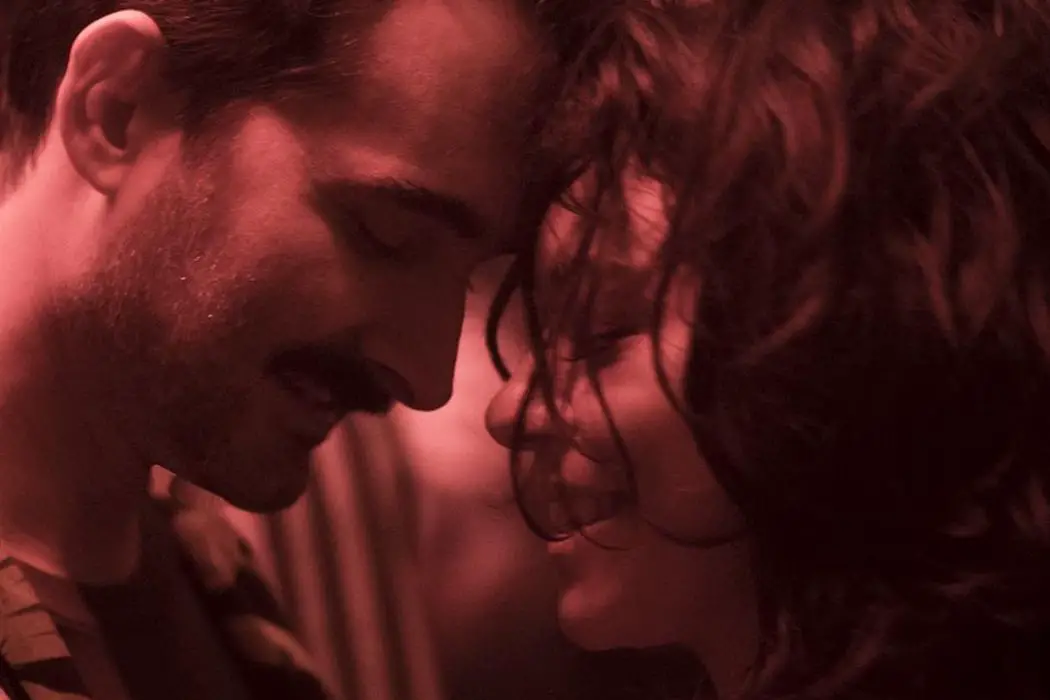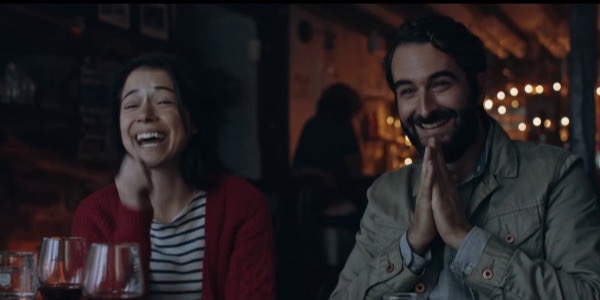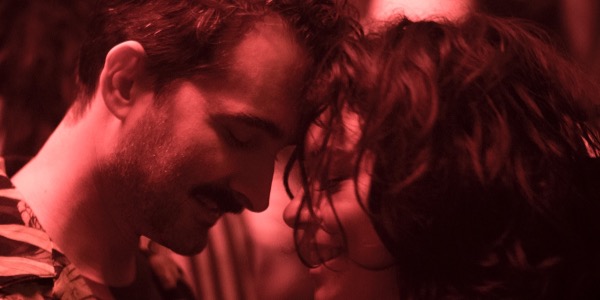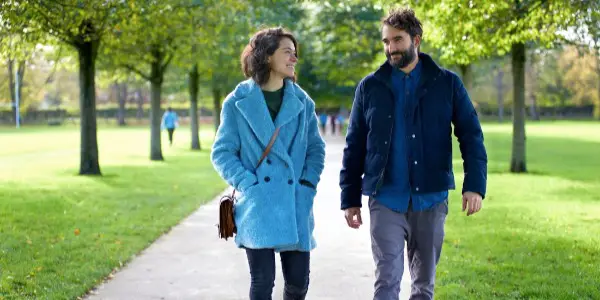Interview: Tom Cullen On How He Made A Fresh Relationship Drama With PINK WALL

Andrew Young is a freelance writer on film and culture…
“The course of true love never did run smooth.”
As overwhelmingly pretentious as this reference may come off, William Shakespeare’s famous statement nevertheless holds the key to the relationship drama on film. The ability to portray love in all its magical, joyous perfection, whilst authentically exploring the imperfections that make it true is a hard trick to pull off, but can produce devastatingly powerful results. With low-budget indie Pink Wall actor-turned-director Tom Cullen has taken a non-linear, episodic approach to love in his quest to achieve this very balance, yet in a fresh, exciting way.
Over the course of half an hour with Film Inquiry, Cullen’s love of his subject, film and love itself become very clear. He openly and enthusiastically explores the details in his filmmaking method and exudes an intelligence and sensitivity which is plainly reflected in his film. A slight, light film, Pink Wall is a worthy addition to the relationship drama canon that deserves not to be overlooked at the box office.
The Idea
For any writer-director, the starting point of a good film is a good idea, a story or emotional arc that will hook and compel an audience. For Pink Wall things appear to be slightly different, combining a very basic and familiar story idea – couple meet, couple fall in love, relationship develops and struggles – with a separate storytelling idea. The six-year relationship depicted in Pink Wall is shown through six individual scenes, each one a brief eavesdrop on a year in the life of Leon and Jenna. These scenes are then presented in a non-chronological, as we steadily piece together the story of their relationship.

Cullen did not set out to make a narrative experiment, however. Rather, his film was initially “a much more conventional movie” and received funding in that form. “It was a couple at the end of their six years and they go to Wales to stay in a cottage, and they thrash out their relationship,” he explains. “They’re kind of at a crossroads, so it was a Friday-Saturday-Sunday structure: Friday they’re stuck in their past; then Saturday they confront their present; and then on Sunday…” All focussed on what in Pink Wall is just ‘Year Six’ then.
Cullen’s decision to change approach was inspired by his realisation that “I had seen this film before and it had been done really really well”. In particular Richard Linklater’s Before Midnight came to mind. Indeed, the film owes much to Linklater, and the finished product less resembles Before Midnight than all three films sped up and pressed into under an hour and a half. Such a sweeping statement is something Cullenhad not considered himself but agrees seems somewhat apt. The thought of making a lesser version of Linklater’s masterpiece held no appeal for Cullen, so he found his own version.
“I only had three months to write the script at all, from funding to shooting. So I was furiously writing whilst I was shooting another thing. It was crazy. Then I kind of took a pause and came up with this idea.” The non-linear, episodic approach allowed Cullen to find his “something different” along the “well-trodden path” of relationship dramas. “I wanted the audience to feel like they’d left having witnessed the relationship, rather than it being dictated to them. I was interested in presenting an argument and allowing the argument to speak. So I came up with this non-linear structure, and it’s designed like memory. In reflections on relationships or experiences, I don’t think memory is linear. I think we juxtapose different moments of our experiences in our relationships to kind of build our emotional landscapes. I feel like even when somebody’s breaking up, they’re also falling in love at the same time. So that’s where it came from.”
The format, which has a freshness that is crucial to the film’s success, not only plays on the workings of memory but allowed Cullen to tease out details in the relationship that had been playing on his mind. Each of the last five years of Leon and Jenna’s relationship are shown in one long scene, but their initial meeting, ‘Year One’ keeps coming back, spliced in amongst the others. “In reflection of any breakup I’ve ever had, it’s interesting that that the happy moments are the strongest memories,” Cullen says to justify this technique. “So any moment that feels difficult, I always in my mind juxtapose it with a moment of pure happiness. And I always think what could have been – ‘we were happy, what went wrong?’ ‘Year One’ is the flesh that combines it. I was really interested in exploring relationships because I think that often when we finish a relationship the initial reaction is to think of it as a waste of time or that because it failed it wasn’t valid.” Yet, Cullen explains, even as Leon and Jenna fall apart, they are still falling in love at the same time.
The Lovers
With the treatment accepted and the structure worked out, the obvious next step in telling a love story is to choose your lovers. The entire basis of a relationship drama rests on the chemistry between and emotional range of its actors, a tricky thing to get right. For Cullen it was easy. Having been in a relationship with Orphan Black Emmy-winner Tatiana Maslany for several years and thinking her “one of the greatest actors of her generation, the choice for Jenna was obvious. In fact, Cullen says, “I wouldn’t make a film without her in it.”
For Leon, Cullen knew he’d found his leading man watching Amazon’s Transparent. Jay Duplass and Cullen had met before at “stupid red carpet events” and Duplass was a fan of the his future director’s acting work. “I said to him: ‘look, this is going to be a f*cking experiment; it’s just 9 days of your life; I think you’re amazing; you get to work with Tatiana.’ And he, like an idiot, said yes, and I’m very glad he was such an idiot.” The film rests on the pair – the rest of the cast are largely Cullen’s own friends and family – and they are predictably superb, bringing plenty of crackling romance in the ‘early’ scenes and, crucially, investing each character with a sympathetic pain.

Despite Maslany and Duplass’ obvious talents, any actor needs a good director, and Cullen says working with the actors was one of the great joys of filming. “Beforehand, I held improvisations with them,” he explains. “What I wanted to do was create memories for them. So I would create moments in their relationship that they would then emotionally recall in the film. Things that aren’t on screen but are talked about.” The preparation process also allowed the actors to develop a relationship with both each other and Cullen, spending much of their two-month build-up talking and sharing ideas together. When filming began Cullen’s inclusive, collaborative approach continued with a directorial style he says is unique whilst taking queues from the likes of Ken Loach, John Cassavetes, Joe Swanberg and Jean-Luc Godard. Cullen would shoot using what he calls a “scriptment”, presumably an amalgamation of a treatment and a full script. “It’s a very detailed outline of the scene and the structure of the scene, the themes of the scene, the shape of it.”
With this ready, he would spend up to two hours with Maslany and Duplass before the crew arrived on set. “We would go through this scene and I would talk about what I wanted and I would start to filter what I wanted through the prism of the actors’ experiences. We’d start to improvise and I’d direct them in their actions to a point that I would get the structure of the scene that I wanted. It’s kind of quite manipulative, but it’s through their experiences. The good thing about it is that the actors have complete ownership over it and I get what I want. What I would then go and do is write these very fixed markers, like a line, or a thought, or an action.” This structured yet improvisational Cullen explains allowed him to both “get the structured scene that I really want, but also get the best bits of improv, where they think and listen intently on every line.” It also allowed parts of the actors’ lives to filter into the story, right down to a joyous use of The Meters’ classic song ‘Cissy Strut’ during the couple’s first night together. “Jay is from New Orleans and grew up listening to The Meters, so when he’s talking about it that’s from him.” Pink Wall, then, is Tom Cullen’s vision by way of Tatiana Maslany and Jay Duplass.
A Man of Many Talents
Such an actor-heavy approach to directing plays to Cullen’s strength as a man who initially became an actor to “understand their psychology” and make himself a better director, his initial choice of career before he went to drama school and “fell hard for acting”. Now best-known as the lead of of Andrew Haigh’s much-praised Weekendand a two-series run in Downton Abbey,Cullen had to get to grips with filmmaking technicalities quickly and on a micro-budget once he finally got his shot behind the camera.
Yet that didn’t stop him from taking an inventive visual approach to the film. “Because it was non-linear, I needed to find a way to delineate the scenes, so that the audience felt that they were different sections. So I made sure that each scene had its own vocabulary, both in the way that I shot it and its feeling.” He continues, “Each scene has its own aspect ratio, the way that I use the camera is very specific, it has its own particular grade. Because I couldn’t afford film, we graded at this amazing place in LA called FotoKem who do Star Wars, and they allowed us to come in and grade for peanuts because they liked the film so much. We used kind of faux Fuji film stock and used different gradients of it throughout the film.” The first year has a grainy quality that Cullen believes “has a romanticism to it”, whilst the final year is desaturated to emulate their fading spark.

Just three months of writing and a short shoot after he first received funding, Cullen’s own entry into the relationship drama ranks was complete, a new vision to sit alongside the Linklaters of the world. It all started quite by accident for Cullen, however. “I was offered an acting job by a producer but couldn’t do it because of scheduling and then completely accidentally pitched this film over the phone to him.” The producer liked the idea perhaps more than even Cullen was expecting. “I sent over a one-pager to him, then he called me up and said ‘I’ve got you a small budget but you’ve got to start filming it in three months’. I was like ‘f*ck’, but I was in between series of TV shows so just thought ‘f*ck it’. So it kind of happened by accident but I’m really glad it did.” The fun Cullen had making the film is clear, and he seems to have taken to directing like a duck to water, relishing the actor-director bond that he repeatedly stresses the importance of.
Cullen is currently developing another film as director, which he says is set in his native Wales and tackles toxic masculinity. Does he see directing becoming his primary career of choice in the future? “I think acting and directing for me sit side by side. I learnt so much about my acting from directing, and acting again has influenced my directing. If I’m lucky enough I’ll hopefully do both until the day I die.” On the evidence of Pink Wall we can only hope that he does.
Do you think Pink Wall offers something new to the relationship drama? What are the best examples of the genre? Let us know in the comments!
Film Inquiry thanks Tom Cullen for taking the time to speak with us.
Pink Wall is out in UK theaters on December 13, 2019.
Does content like this matter to you?
Become a Member and support film journalism. Unlock access to all of Film Inquiry`s great articles. Join a community of like-minded readers who are passionate about cinema - get access to our private members Network, give back to independent filmmakers, and more.
Andrew Young is a freelance writer on film and culture from Manchester, UK. If you like his writing, Andrew also runs a more informal film website at reeltime.blog













